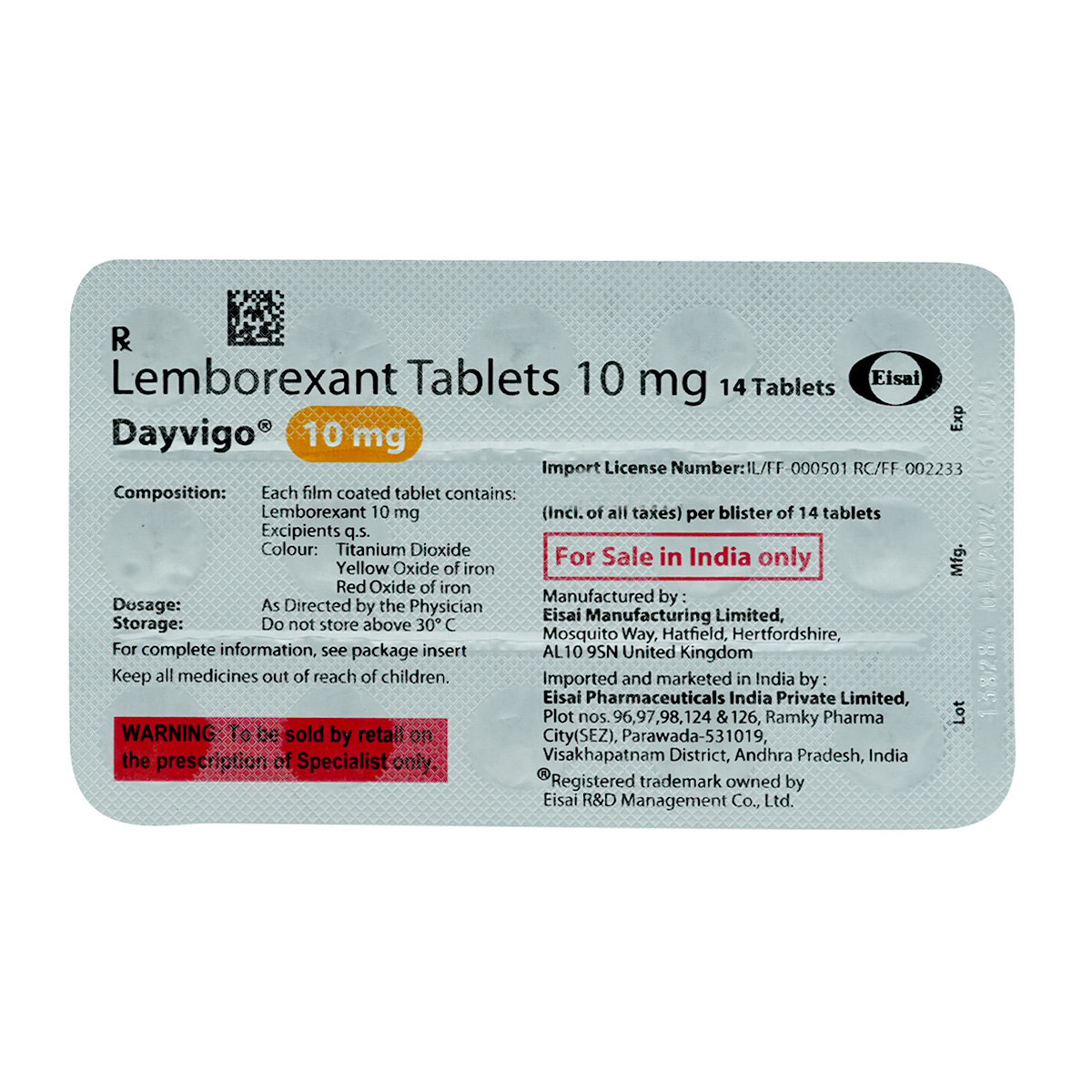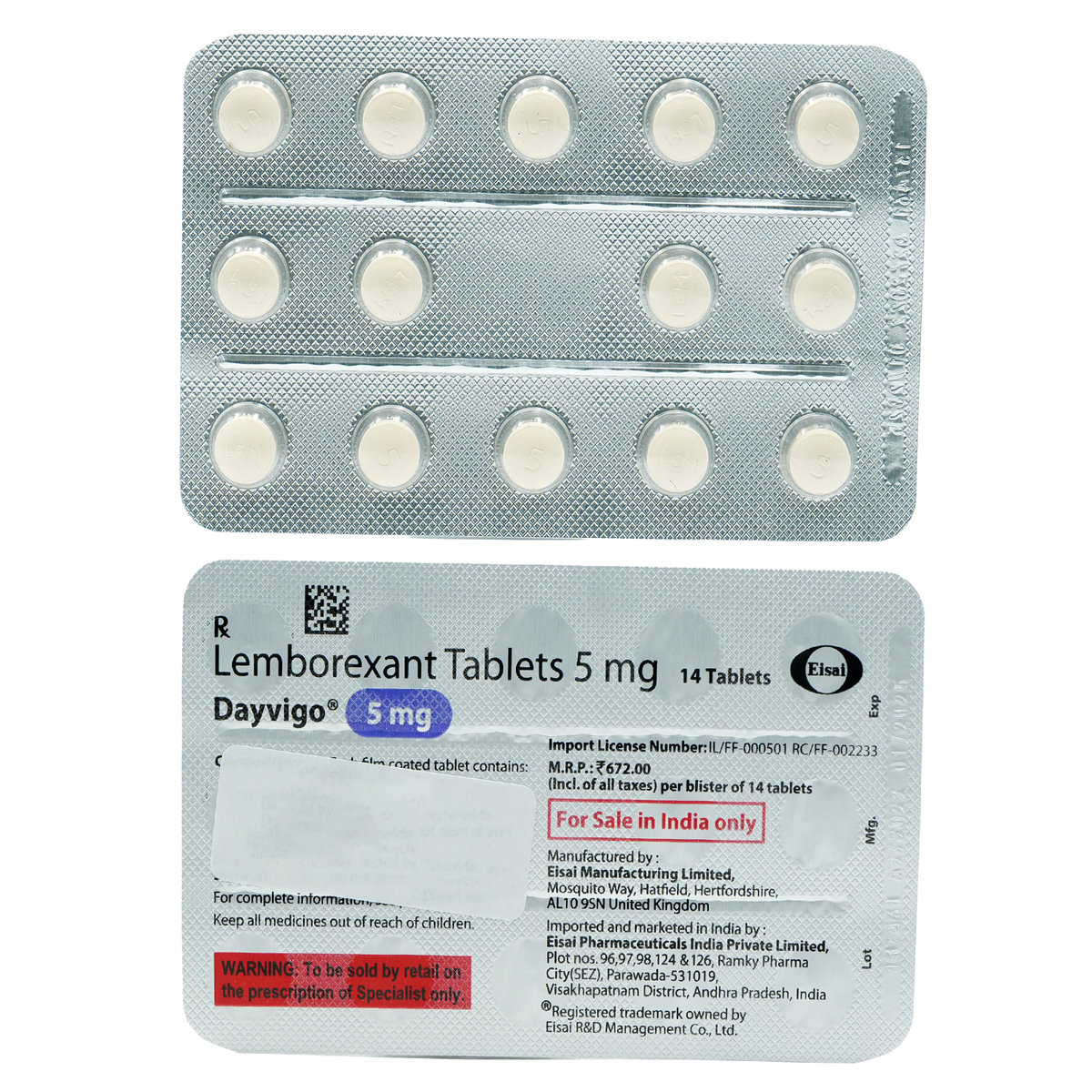Lemborexant
About Lemborexant
Lemborexant is used in the treatment of insomnia (difficulty in falling or staying asleep). Insomnia is a sleep disorder that causes difficulty falling or staying asleep. It may be acute (short-term) or chronic (long-term).
Lemborexant contains Lemborexant, which works by blocking orexin receptors (which play a role in wakefulness) in the brain. Thus, it helps to improve sleep efficiency, reduce sleep latency (the time taken for you to go from being fully awake to sleeping) and lengthen sleep time.
Lemborexant may cause some side effects, such as drowsiness, headache, or tiredness. Most of these side effects of Lemborexant do not require medical attention and gradually resolve over time. However, if these side effects persist or worsen, please consult your doctor.
If you are allergic to Lemborexant or any other medicines, please tell your doctor. Avoid driving as Lemborexant may cause drowsiness. Do not take Lemborexant if you have narcolepsy (fall asleep often at unexpected times).
Uses of Lemborexant
Medicinal Benefits
- Lemborexant contains Lemborexant, which helps improve sleep quality in individuals with difficulty falling or staying asleep.
- It works by blocking orexin receptors in the brain, chemicals responsible for wakefulness, thereby promoting relaxation and sleep.
- Lemborexant shortens the time it takes to fall asleep, helping you drift into sleep more quickly.
- It enhances the overall quality and continuity of sleep, ensuring a more restful and refreshing experience.
- By reducing nighttime awakenings, Lemborexant helps maintain longer and uninterrupted sleep.
- Improved sleep leads to better alertness, mood, and cognitive performance during the day.
Directions for Use
- Lemborexant can be taken 1 hour before a meal or 2 hours after a meal.
- It is advised to take Lemborexant once a day before bedtime; however, follow your doctor's instructions on the dosage and timing of this medication.
- Swallow the whole tablet with a glass of water.
- Do not crush, break, or chew it.
Storage
Side Effects of Lemborexant
- Drowsiness
- Headache
- Tiredness
Drug Warnings
- If you are allergic to Lemborexant or any other medicines, please tell your doctor.
- Lemborexant is not recommended for children below 18 years of age.
- If you are pregnant or breastfeeding, please inform your doctor before taking Lemborexant.
- Avoid alcohol consumption while taking Lemborexant as it may increase the risk of serious side effects.
- Do not drive or operate machinery after taking Lemborexant as it causes drowsiness.
- You are recommended to avoid taking Lemborexant with or immediately after a high-fat and high-calorie meal, as it makes it difficult for your body to absorb Lemborexant.
- Avoid taking Lemborexant if you have narcolepsy (fall asleep often at unexpected times).
- You are advised not to take Lemborexant if you do not have 7 hours of sleep before being active again.
- Patients with a history of abuse or addiction to alcohol or other drugs should be monitored carefully, as they may be at an increased risk for abuse and addiction to Lemborexant.
Drug Interactions
Drug-Drug Interaction: Inform your doctor about all the medicines you are taking, including prescription and non-prescription medicines, vitamins, and herbal supplements.
Drug-Food Interaction: Lemborexant may interact with grapefruit juice. Therefore, avoid grapefruit and grapefruit juice during treatment with Lemborexant as it may increase the amount of Lemborexant in the blood and increase the risk of side effects such as abnormal sleep behaviours, central nervous system depression, worsening of depression or suicidal thoughts, changes in heartbeat, or headache.
Drug-Disease Interaction: Avoid taking Lemborexant if you have narcolepsy (fall asleep often at unexpected times). If you have a history of cataplexy (sudden onset of muscle weakness), mental illness, depression or suicidal thoughts, daytime sleepiness, drug or alcohol abuse or addiction, or have breathing problems or lung problems, including sleep apnea (a severe condition in which breathing stops and starts repeatedly in sleep), or liver problems, inform your doctor before taking Lemborexant.
Drug-Drug Interactions Checker List:
Safety Advice

Alcohol
unsafeAvoid consumption of alcohol while taking Lemborexant as it may increase the risk of serious side effects.

Pregnancy
consult your doctorLemborexant is given to pregnant women only if the doctor thinks the benefits outweigh the risks. Therefore, please consult a doctor if you are pregnant.

Breast Feeding
consult your doctorIt is unknown if Lemborexant is excreted in breast milk. Therefore, please consult a doctor before taking Lemborexant if you are breastfeeding.

Driving
unsafeAvoid driving or operating heavy machinery until you feel fully awake, as you may still feel drowsy the next day after taking Lemborexant.

Liver
consult your doctorIf you have liver diseases/conditions, inform your doctor before taking Lemborexant.

Kidney
consult your doctorIf you have any concerns regarding the use of Lemborexant in patients with kidney problems, please consult a doctor.

Children
unsafeLemborexant is not recommended for children below 18 years, as the safety and effectiveness have not been established.
Habit Forming
Diet & Lifestyle Advise
- Follow a regular sleep pattern. Do not take a nap during day time.
- Avoid watching TV, and using mobiles or laptops just before bedtime.
- Avoid consumption of alcohol as it may increase drowsiness.
- Do regular exercise and maintain a healthy body weight.
Patients Concern
Disease/Condition Glossary
Insomnia: It is a disorder of sleep associated with problems in falling or staying asleep. It may be acute (short-term) or chronic (long-term). Acute insomnia may last from one night to a few weeks and occurs due to stress or life changes. Chronic insomnia may last more than three nights per week for over three months. Insomnia is mostly caused by depression, stress, anxiety, jet lag, shift work, uncomfortable beds, chronic illness, caffeine, nicotine, or alcohol intake, or due to certain medicines. It may be treated using sleeping pills, behaviour therapy, changes in sleep habits, and identifying and treating chronic conditions.
FAQs
Lemborexant is used in the treatment of insomnia (difficulty in falling or staying asleep).
Lemborexant contains Lemborexant, which works by blocking orexin receptors (which play a role in wakefulness) in the brain. Thus, it helps to improve sleep efficiency, reduce sleep latency (the time taken for you to go from being fully awake to sleeping) and lengthen sleep time.
You are recommended to take Lemborexant right before going to bed and take it only when you can stay in bed for a full night (at least 7 hours). Avoid taking Lemborexant with or immediately after a meal, as it may take longer to work.
Lemborexant may cause drowsiness. Therefore, it is recommended to avoid driving or any other activities that require mental alertness after taking Lemborexant.
You are recommended to take Lemborexant for as long as your doctor has prescribed it. However, if insomnia persists or worsens after using Lemborexant for 7 to 10 days, please consult your doctor. Lemborexant may be habit-forming. Therefore, avoid taking it in larger doses, more often or for a longer period than your doctor prescribes.
Lemborexant may cause side effects such as drowsiness, headache, or tiredness. Most of these side effects of Lemborexant do not require medical attention and gradually resolve over time. However, if these side effects persist or worsen, please consult your doctor.
People who are allergic to any of the components in Lemborexant or have narcolepsy (fall asleep often at unexpected times) should avoid taking Lemborexant.
Lemborexant should be taken with other medicines only if advised by the doctor to prevent any interactions. Talk to the doctor if you have any concerns.
Lemborexant should be used during pregnancy only if prescribed by the doctor. The doctor will prescribe Lemborexant only if the benefits outweigh the risks.



